With the US release of Blumhouse’s THE INVISIBLE MAN this week, we’re going to take a look at films with characters that are hard to see. For this is…

There’s an obvious irony to the Invisible Man being the one Universal Monster that never quite endured like the others. Where Dracula, Frankenstein, The Wolf Man, The Mummy, and even the Creature from the Black Lagoon etched themselves into the pop culture consciousness, their invisible brethren have always felt like tagalongs. It wasn’t for lack of trying on the studio’s part, however, since Universal cranked out four sequels before staging an inevitable encounter with Abbott and Costello in 1951.
What’s more, this franchise was especially inventive: sure, most Universal Monsters sequels zigged and zagged in odd directions, but THE INVISIBLE MAN practically swapped genres with each outing. James Whale’s 1933 original is a tragic sci-fi-horror hybrid about a man who goes insane after meddling with forces beyond man’s purview. The 1940 follow-up starring Vincent Price is essentially a “wrong man” thriller, while THE INVISIBLE WOMAN is a gender-bent screwball comedy that explores class politics. Released less than 8 months after Pearl Harbor, 1942’s INVISIBLE AGENT exploits that day of infamy as a World War II spy thriller/propaganda movie.
It wasn’t until 1944’s THE INVISIBLE MAN’S REVENGE that Universal produced a sequel that feels like a conventional riff on the theme. Having apparently exhausted every other avenue for this premise, this is when the studio delivered the most horror-tinged take involving a psychopathic killer turning invisible to take revenge on his enemies. It is perhaps the movie many may have expected Universal to churn out to quickly capitalize on the success of the landmark original. Instead, it arrived over a decade later and practically signaled the end of this strange franchise, sending it out on a perfectly fine—but not exactly rousing—note. That seems about right for a series that never quite rose to the prominence of its contemporaries.
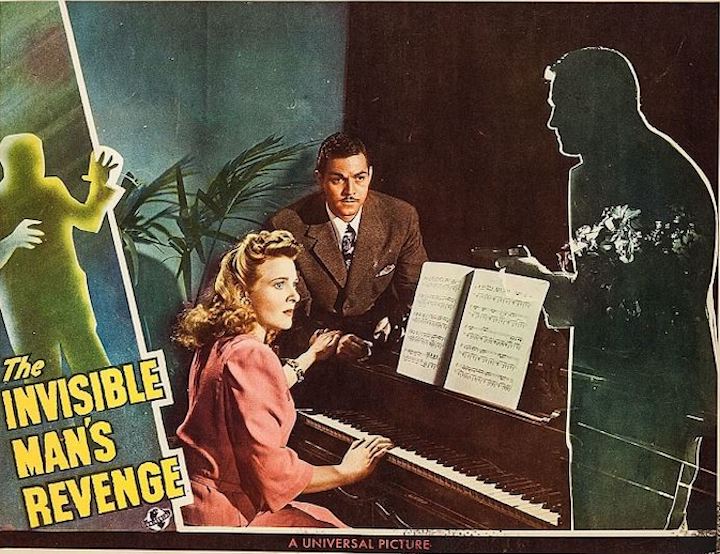
When we first meet Robert Griffin (Jon Hall), he doesn’t seem to be a madman. Rather, he just seems to be an especially hurried, agitated stowaway bailing from a freighter he’s taken to London. It’s not until we see a newspaper headline that we learn that he’s recently escaped a South African asylum, where he killed a pair of orderlies during his escape. Even so, he makes a compelling case that he’s the latest misunderstood sad-sack unwittingly caught up in a nefarious plot.
In this case, Griffin insists that his incarceration only happened because the Herrick family—specifically Sir Jasper and his wife Irene (Lester Matthews & Gale Sondergaard)—left him for dead several years ago following the discovery of a diamond mine. What’s more, they took off with the entirety of the fortune they agreed to split between each other. The Herricks maintain their innocence, claiming that they assumed Griffin died. No matter, the wronged man insists—he’s back to take revenge by any means necessary. Luckily, there’s a colorful assortment of locals willing to help him in his quest, including an eccentric doctor (John Carradine) who’s capable of turning Griffin invisible, providing him the perfect cover to carry out his nefarious plans.
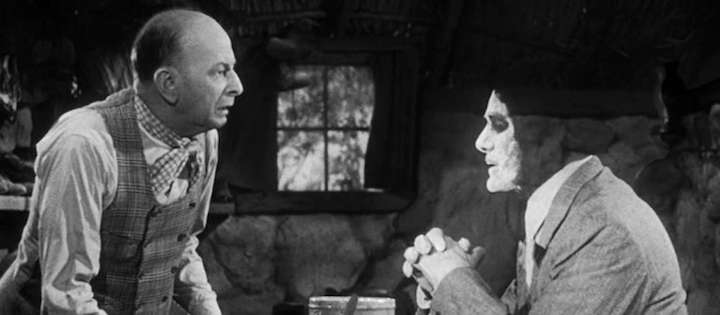
For all its tangled narrative threads and its protagonist’s hound-dog posturing, THE INVISIBLE MAN’S REVENGE takes a long-winded route in arriving at what its title promises. Considering the era, it isn’t too surprising that it’s still not the most explicit or graphic film when it does get around to that nasty business, so director Ford Beebe and screenwriter Bertram Millhauser (both long-time studio staples) don’t exactly foreground the horrific details of Griffin’s depravity. Still, it’s pretty ghastly stuff involving blood transfusions, not to mention a plot to simply take the Herricks’ daughter, Julie (Evelyn Ankers), for his wife.
Never mind that he’s invisible and spends the entire film tormenting the poor girl’s family, going so far as to essentially hold them hostage in their own home at one point, or the fact that she already has a fiancé (Alan Curtis). As is customary with so many of these Universal sequels, most of the action occurs during the climax, when all of these combustible elements collide satisfyingly—if not abruptly—enough.
The journey is more important than the destination in THE INVISIBLE MAN’S REVENGE, a film that scatters its mostly fleeting charms throughout for an audience patient enough to appreciate them. Chief among them is Ford’s ability to harness those familiar Universal production values to infuse the picture with gothic shadow-play and striking compositions, creating the tenor of a genuine horror movie and bringing it tonally in line with Whale’s original. Again, this is the sequel you turn to you if you need an INVISIBLE MAN movie that simply features its title character terrorizing innocent victims, and it very much reflects that in the way Ford embraces that fog-drenched, Universal backlot aesthetic.
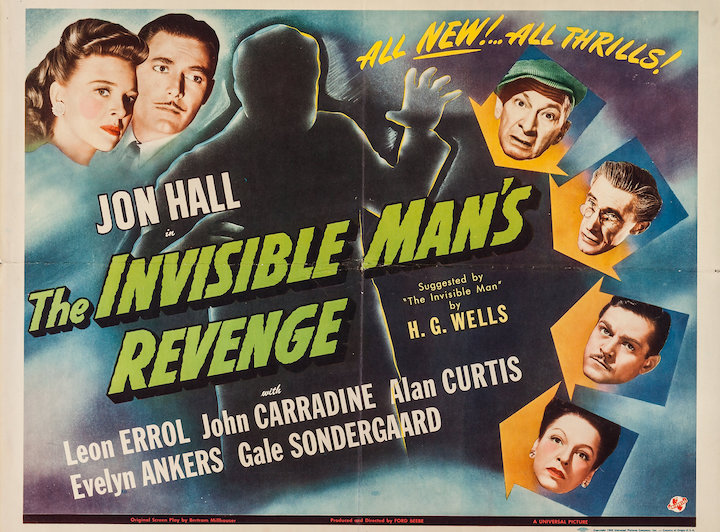
It’s also most evident in Hall’s increasingly unhinged performance. His early scenes might hint that he’s taking a page out of the “Lon Chaney tortured protagonist” playbook, but his character quickly goes off the deep end, allowing him to give a delightfully wicked turn. Unlike some of his predecessors, Robert Griffin is not exactly a good man driven to insanity by the invisibility serum: he’s fairly unrepentant before a scientist grants him this twisted gift, and he only becomes more bold as he lords his power over his victims.
Hall doesn’t exactly have the velvety, smooth presence of Claude Rains, which is fitting: his Griffin is much more coarse and rough around the edges, and this maniacal performance deftly straddles the line between playful and sinister. It’s a remarkable inversion of his performance in INVISIBLE AGENT, where he played the square-jawed heroic take on this character. He acquits himself much better in THE INVISIBLE MAN’S REVENGE, so much so that he’s arguably the most memorable Invisible Man following Rains’s original turn.
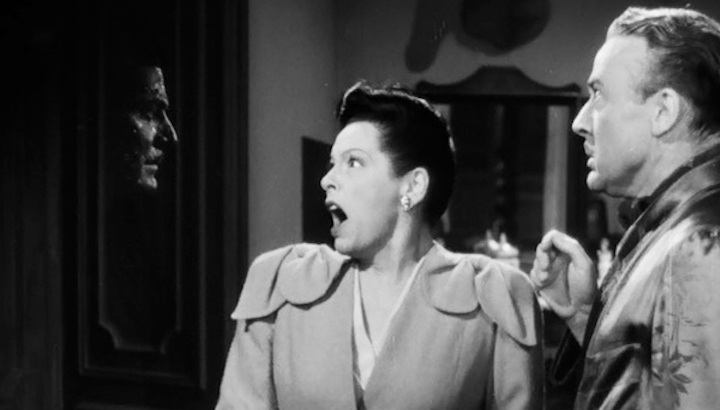
The movie surrounding him rises to his performance just often enough, too. His supporting cast—particularly Carradine and Leon Errol (providing comic relief as a scatterbrained cobbler)—provides some nice levity, while the invisibility effects are as striking as ever, used here not only to make Hall disappear, but also Carradine’s prize mutt, Brutus. This trick would have been old hat by this point, but it’s still a marvel of ingenuity, not to mention a reminder that movies are essentially magic tricks. Even if THE INVISIBLE MAN’S REVENGE is slightly more grim than its predecessors, it retains enough of a light touch to maintain Universal’s signature serial-pulp tone.
Maybe it’s a bit of a trifle, even. To be sure, it’s easy to imagine this take being more substantial had it bothered to delve into the psychology of a man who was betrayed and left for dead, or even if it bothered to develop his victims in a way to make the drama more compelling. Save for the completely innocent Julie, it’s hard to feel one or the other about the Herricks: sure, maybe they truly did believe their friend to be dead, but they also don’t hesitate to toss him back out on his ass and tear up the contract he’d preserved all those years.
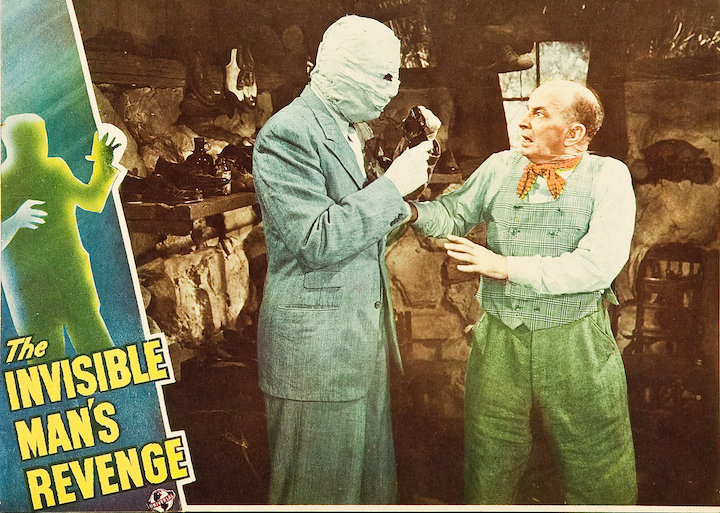
There’s a delicious irony to a man they try to make disappear actually becoming invisible to make them atone for their sins. You sense that Griffin is perhaps even justified in upending their cozy, privileged existence, and the film itself even makes a last-minute play at generating sympathy for the monster when a character notes that he never would have lost his mind had he not been abandoned in an asylum by his friends.
However, it’s too little and too late to suddenly feign interest in moral complexity like this: ultimately, THE INVISIBLE MAN’S REVENGE doesn’t quite carry the tragic weight of the best Universal Monster movies because it’s more interested in exploiting the drama between its characters instead of investing in those characters.
It is, however, a perfectly fine sequel, something the studio also excelled at producing. THE INVISIBLE MAN still might not be the first (or second, or third) series that comes to mind when recalling Universal’s legendary stable, but it was certainly among the most inventive and ambitious across the board. THE INVISIBLE MAN’S REVENGE brings the series full-circle, so to speak, returning it to its horror-tinged roots and recalling what makes this premise so captivating—and scary—in the first place.
Tags: Alan Curtis, Bertram Millhauser, Evelyn Ankers, Ford Beebe, Gale Sondergaard, H.G. Wells, Invisible Man, john carradine, Jon Hall, Leon Errol, Lester Matthews, The Invisible Man's Revenge, Universal Horror, Universal Monsters

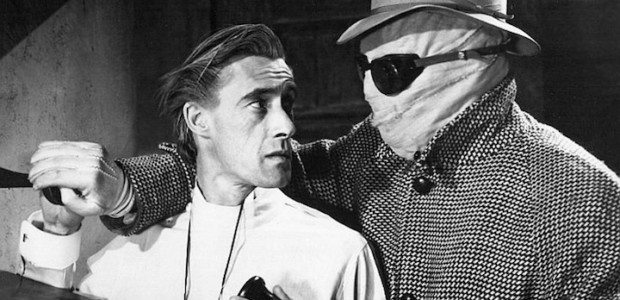
No Comments